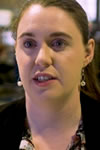
Ask me a question...
What were the main 'career decision' milestones in your life so far?

The decision to do two languages French and German at secondary school, and the choice of two languages out of three subjects for my Arts Degree (French, Italian and Politics) were important steps in terms of my language skills but the most significant choice for me was to go on the student exchange Erasmus as I met my Italian husband while on Erasmus in France and my French improved greatly as a result as we spoke in French to one another.
I also drastically improved my proficiency in Italian particularly when I travelled to visit his hometown for the Easter holidays. I had only studied Italian in my first year of my Arts Degree but being around a group of Italian students for the academic year in France, I picked up a lot of phrases and started to understand more Italian and I also learnt a great deal about Italian culture.
The Erasmus experience deepened my passion for languages and new cultures and led me to apply for a role as an English tutor at a University in France on graduating. I thoroughly enjoyed the experience and chose work as an English teacher again a few years later in Catania in Sicily. I enjoy teaching but often wondered what a career in law would be like so then decide to try a postgraduate diploma in legal studies in DIT on returning from Sicily.
I was very taken with law and the array of subjects and areas of practise and I decided to embark on a solicitor traineeship. Luckily I have had the opportunity to use my fluency in French and Italian throughout my career when dealing with foreign clients and assisting in translation for colleagues when the need arises.
Who are the people who most influenced your career direction?

I have also been encouraged in school and at home to go for what I want and to do what I enjoy. This is why I have tried more than one career and gained a breadth of experience. My mom encouraged me to choose a profession and in particular law she always said to me you should try to "be somebody" and pursue a profession as opposed to work "at something".
How did you go about getting your current job?

I applied for a traineeship by way of a detailed application form. I was then selected for an interview and called back for a second round interview and then offered a traineeship to become a solicitor. I was phoned by one of the partners who interviewed me to tell me I had been successful.
Describe a typical day?

The first task is usually to reply to emails that have come in since the end of the previous working day. Sometimes I can do this on my phone on my way into work on the luas if short responses are required. I may also have a number of calls scheduled with clients or barristers throughout the day. I may have to read documents or emails in advance in preparation for the calls.
I might also have to attend meetings with clients to discuss the progress of their court cases or get information from them on their case. Sometimes barristers would also attend these meetings to advice on strategy for the litigation. I would also have to spend time on preparing letters of advice to clients or letters on behalf of our clients to other solicitors who act for parties involved in legal disputes with our clients.
I might also have to research a particular legal issue or look up case law or precedent on a particular point that might help our client's case. [Irish lawyers can be barristers or solicitors. Barristers specialise in courtroom advocacy and litigation but they are not instructed directly by clients. Solicitors deal with clients and prepare the case with the client and then engage a barrister to present the case to Court and advocate in front of the Judge.
Most solicitors are employed by a law firm or company as an in-house solicitor. As an employee, solicitors are likely to have job security with a regular income, whereas barristers tend to be self-employed. Being self-employed can lead to uncertainty regarding income particularly at the beginning of their careers. This is less of an issue as barristers become more established in their careers and more experienced.
What are the main tasks and responsibilities?

In the litigation department we assist clients involved in legal disputes and court cases. My main tasks are advising clients in an array of scenarios such as on proceedings that they may be considering against another party on the breakdown of a business relationship or in the defence of proceedings they did not expect to be dragged into. In the litigation department there are a number of teams with specialities such as commercial, intellectual property, landlord and tenant, debt-recovery, medical negligence, regulatory and insolvency.
I work on the insolvency team. We also work with insolvency practitioners and advise them in their roles as receivers, liquidators and examiners of companies. We also advise directors or creditors of companies who are considering an insolvency process such as liquidation or receivership for such companies and need information on how the process works and how it might impact them as directors or creditors.
What are the main challenges?

Our work often involves deadlines. A client might require advice in a short time frame as they are under pressure to make a decision. We are often under pressure with tight deadlines in court cases. A judge might order that we need to file a court document setting out our client's case or defence within a week.
The document could go through a number of drafts and be reviewed by and contributed to by a number of people such as a few people on behalf of the client, the barrister and a partner in our firm and in this way it may take a lot of time to finalise. Although time-pressured and sometimes stressful, working in such an environment for long hours and working closely with great minds can be interesting and exciting!
What do you like most?

It is always varied so the work can be stimulating, interesting and exciting. It can also be stressful, pressurised and tiring particularly when a court case is at hearing but even when it is the diversity and adrenalin rush makes the long hours tolerable! Its often nice to escape the office and go to court for the day for a change of environment!
Is there anything that isn't great?

I do not like billing but it is a very necessary part of working in a commercial firm! We need to record the time spent on client files and account for every minute while in the office and this can be difficult.
What particular skills do you bring to your workplace?

My language skills are an asset that I bring to my role. I have often used my proficiency in Italian and French, for example with clients who speak those languages but are doing business in Ireland and require Irish law advice but prefer to converse in their native tongue than English. They may not be able to express themselves as fully in English and are more comfortable in their native language.
It is also the case that people reveal more of their personality when conversing in their native tongue and so in this way my fluency and willingness to speak their language can help me to build personal relationships with clients. I have also been called upon by colleagues to translate emails or documents into French or Italian.
What subjects did you take in school and how have these influenced your career path?

I chose two languages in school- French and German. I had the choice of German or Art and Music. Most people chose Art and Music and there was only one class out of six classes of first year doing two languages. I believe that doing two languages improved my proficiency in language in general and my ability to learn new vocabulary and grasp new concepts.
I realised I was good at working out how to express myself in French and German and I always wanted to learn new words and phrases and this led me to then choose languages as two of my three subjects for an Arts Degree at third level. I knew that I would like to do French at university and then when I learnt that Italian was on offer I thought why not try something new! I also knew that Italian was similar to French as they are both Latin-based languages and I could guess some of the Italian vocabulary from my knowledge of French.
What is your education to date?

Leaving Certificate, First Class Honours Arts Degree (French and Politics), Masters Degree in Politics, Postgraduate diploma in legal studies, FE1 entrance exams to the Law Society, qualification as a solicitor at the Law Society.
What aspects of your education have proven most important for your job?

I believe that having a diverse education was very helpful in securing a traineeship with a top 5 law firm. The process is very competitive with hundreds of graduates applying for traineeships, approx 100 of which were called for interview and then for my year 30 were offered training contracts. It was important to make yourself stand out in the application form.
My skills in languages was an asset I could offer and also led me to interesting work experience such as teaching English for a year in France and another year in Sicily. These were experiences I could talk about in interview and refer to when asked for experiences I had of using skills such as communication, problem-solving or working as part of a team. In general law graduates have a similar education and formation to the point of starting a training contract so it is useful to have varied experience to draw from and an all-round education.
Studying languages helps to broaden the mind and allows us to think about things in a different light as there are so many ways to say the same phrase in each language.
What have been the most rewarding events in your career so far?

Receiving positive feedback and appreciation from clients who were happy with how I worked for them....in particular in scenarios where their court cases were not successful but they were happy with the service nonetheless.
What personal qualities do you have that helps you in your career?

Ambitious, competitive, inquisitive, enthusiastic, friendly, compassionate, interested in learning new things and current affairs.
Does your job allow you to have a lifestyle you are happy with?

Unfortunately being a solicitor in a commercial firm can mean long hours and at least 9-530 each day but as I've progressed I've been able to manage my time better. I work from home on a Tuesday which makes a big difference to my week. With advances in technology wording remotely has become easier as I can log onto my pc from home and transfer my extension to my mobile phone. Hopefully more flexible working arrangements are to come for most professions.
What advice would you give to someone considering this job?

It is important to be a hard-worker, confident, have a "thick skin" and to be ready to push yourself and learn as much as you can as a trainee solicitor. The process of obtaining a traineeship is very competitive and results and your "CV" matters in this respect to be selected but often in the early years as a trainee the most important thing is to show ambition and drive and an ability to get the job done despite obstacles and pressures.
It is also important, as in every walk of life, to show compassion and form personal bonds with colleagues and clients. I believe that people work their best and reach their potential when encouraged in a friendly and positive environment.
What are the three most important personal characteristics required for the job?

A good communicator, team-player and time-keeper.
Have you undertaken, or do you plan to undertake any further training as part of your job?

I have completed Law Society Diplomas in litigation and insolvency since qualifying as a solicitor. I also did a course on personal insolvency at the Law Society when the personal insolvency legislation was introduced.
What kinds of work experience would provide a good background for this position?

Work experience in a law firm or any type of corporate firm.
What is your current job title?

Solicitor at William Fry.
- Career Development?
- Current Job?
- Education and
Training?
- Personal Qualities?
- Advice for Others?













